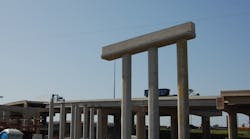State and local governments are pushing forward more of their own transportation funding solutions – with voters passing almost 70% of such initiatives placed on ballots across the country in last week’s midterm election – because the federal government is becoming an increasingly “unreliable partner” in terms of providing an adequate monetary support, according to several experts.
“I’d say while there is an understanding among states and localities that the federal government has become an unreliable partner in transportation in recent years and that short-term extensions and general fund transfers from Congress aren’t exactly giving them any certainty about investing, they aren’t willing to cut the cord just yet,” Sean Slone, program manager for transportation policy at the Council of State Governments (CSG), told Fleet Owner.
“States and localities are moving forward to address their transportation needs at the ballot box and in the legislature, but most would still like to have a strong federal partner going forward,” he stressed.
“They aren’t doing [that] with the idea in mind of replacing the federal commitment,” Sloane pointed out. “They’re doing so to advance local projects, to take advantage of economic development opportunities, to move projects forward that they haven’t been able to get to for years, to do something other than fixing potholes and paying debt service on old projects, or for any number of other reasons.”
Pete Ruane, president & CEO of the American Road & Transportation Builders Association (ARTBA), noted that states rely on federal funds for, on average, 52% of their highway and bridge capital investments.
He added that lending rule changes approved by the U.S. Federal Reserve, the Office of the Comptroller of the Currency, and the Federal Deposit Insurance Corporation back in September are exacerbating state and local transportation funding efforts as those changes preclude banks from using municipal bonds to comply with new liquidity standards.
“This decision will increase the financing cost of infrastructure projects for state and local governments by imposing a constraint on the market for municipal bonds,” he said. “That could also adversely impact development of public-private partnerships for transportation projects.”
Ruane also emphasized that those changes affect the temporary revenue patch for the highway trust fund (HTF) passed by Congress back in July, meaning the fund now faces another revenue shortfall at the beginning of the 2015 construction season.
C. Kenneth Orski – a 30-year transportation consultant who served as associate administrator of the urban mass transportation administration under Presidents Nixon and Ford – noted that a full six-year surface transportation measure envisioned by Sen. Barbara Boxer (D-CA), the current chairman of the Senate’s Environment and Public Works Committee, would require roughly $330 billion to maintain current (fiscal year 2014) spending levels.
Yet HTF revenue and interest over the same period are projected by the Congressional Budget Office to bring in only $230 billion—leaving what Orski called “a truly staggering funding gap” of $100 billion.
“The only feasible way to raise this kind of money would be to very substantially increase the federal gas tax—a solution favored by many in the transportation industry,” he said. “But a boost in the gas tax remains political anathema. Only three Senators – Democrats Tom Carper of Delaware and Chris Murphy of Connecticut plus Republican Bob Corker of Tennessee – and one House Democrat (Earl Blumenauer of Oregon) have come out publicly in favor of raising the federal gas tax.”
Lining up against them is what Orski termed “a solid majority of congressional Republicans and Democrats, the White House and the public at large.”
Indeed, Orski said a Gallup poll in April 2013 found that two-thirds of Americans are against raising the fuel tax – even if it went toward infrastructure improvements – while an Associated Press poll released back in August found only 14% of those polled would support a boost in the federal gas tax while 58% would oppose it.
CSG’s Sloane adds that one reason voters approved a ballot measure to nix indexing Massachusetts’s state fuel tax is to express the desire for what he calls “more transparency and accountability” when it comes to state government and how transportation is funded going forward.
“Voters want to believe that if they’re told they’re going to pay more in taxes to fund transportation, that money is actually going to transportation and that it won’t be raided to fund some other budget need,” he explained. “I think there is a realization that there has been too much robbing Peter to pay Paul in some states and that it has contributed to the overall underinvestment in infrastructure in this country and in some cases hurt the credibility of state officials.”
And while the repeal of the indexing mechanism in Massachusetts won’t completely kill the chances for seeing more “automatic” fuel tax indexing around the country, he thinks as a concept it’s probably on “life support” and states may be hesitant to pass such measures in the future.
And that’s why the increasing vagaries of federal transportation funding pose such a problem, Sloane pointed out.
“Many states still rely on the federal government for a significant portion of their transportation funds – both formula funding and project assistance through programs like TIFIA and TIGER,” he said. “They don’t want that to change.”



